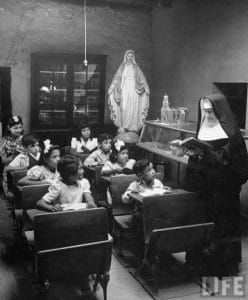On Friday, a stronger than expected majority of voters in Ireland chose to repeal the nation’s eighth amendment that protected the lives of the unborn. In a surreal and chilling scene, thousands took to the streets to celebrate the transition to a new era that will guarantee the termination of innocent life in the womb.
As everyone knows, historically, Ireland is overwhelmingly Catholic. And as almost everyone now knows, Ireland today is secular in the extreme. The influence of the Catholic Church there has plummeted over the past several decades. After the vote, many headlines included references to the waning influence of the Catholic Church in the daily lives of the Irish. While there are many angles to this story deserving attention, there’s one that might slip beneath the radar: the state of Catholic schools.
Polls indicate that the overwhelming majority of young Irish voters voted in favor of the the repeal. One headline called the vote a “youth-quake.” It’s also true that the overwhelming majority of young voters attended Catholic schools at some point during their lives. You can probably see where this is going.
What does Friday’s vote say about the quality of Catholic schools in Ireland? What is (or isn’t) being taught in these classrooms? Certainly, the result of Friday’s vote demonstrates that Catholic schools in Ireland are failing to live up to their responsibility in assisting parents with the formation of young Catholics in the teachings and disciplines of the faith. Is all the blame to be placed squarely on Catholic schools? No. But those in charge of the schools certainly cannot escape a share of the responsibility.
We need Catholic schools to be authentically, unabashedly Catholic, which means we need teachers living authentically Catholic lives. We can no longer presume that, if a school calls itself “Catholic” it is actually living up to that name. Some questions to ponder:
- Who are Catholic schools hiring to teach in the classrooms?
- Are the teachers well-formed in the faith?
- Do the teachers have a mature prayer life?
- Do teachers demonstrate a passion for the truth and for the beauty of the virtuous life?
- Do teachers realize that fidelity to the Catholic faith will often put them at odds with the expectations of the secular culture?
Nemo dat quod non habet. You cannot give what you do not have.
If teachers at Catholic schools do not embrace Church teaching in its entirety, they won’t succeed in passing it on to the students. If they don’t strive to live out the Catholic moral life in all aspects of their own lives, they cannot meaningfully impart it to the students. If teachers at Catholic schools are ideologically more aligned to the causes, assumptions and beliefs of a post-modern, secular age than to the tenets of Catholicism, is it any surprise that their students are going to absorb those worldly beliefs in the classroom? If teachers believe that it is acceptable to subscribe to some of the Church’s teaching, while rejecting other essential aspects, is it any wonder that their students will begin to think it is okay for them to pick and choose as well? As Elizabeth Anderson recently observed, “Therefore, to have any adult—be it staff, teacher, or volunteer—working in a Catholic school and openly modeling a life which contradicts Catholic teaching undermines the integrity of the education as a whole.” This point cannot be emphasized enough.
In his Apostolic Constitution, Ex Corde Ecclesiae, Pope Saint John Paul II wrote the following regarding the responsibilities of Catholic school teachers.
§ 3. In ways appropriate to the different academic disciplines, all Catholic teachers are to be faithful to, and all other teachers are to respect, Catholic doctrine and morals in their research and teaching. In particular, Catholic theologians, aware that they fulfil a mandate received from the Church, are to be faithful to the Magisterium of the Church as the authentic interpreter of Sacred Scripture and Sacred Tradition(50).
Pope Saint John Paul II’s outstanding letter should be required reading for all who teach at Catholic schools. He was not only addressing Catholic universities. Early in the document, he makes clear that, “it is also meant to include all Catholic Institutions of higher education engaged in instilling the Gospel message of Christ in souls and cultures.”
 In light of the fiasco in Ireland, those responsible for Catholic education around the world, and in particular in the United States, should take stock of the state of Catholic identity (or lack thereof) at schools.
In light of the fiasco in Ireland, those responsible for Catholic education around the world, and in particular in the United States, should take stock of the state of Catholic identity (or lack thereof) at schools.
- Are Catholic schools centers of authentic Catholic life and culture?
- Are these schools marked by stark, counter-cultural habits and dispositions that set them apart from the prevailing zeitgeist of the public schools and the secular culture at large? Or, are Catholic schools more worried about exhibiting and living up to the expectations of the mainstream, Progressive academic culture?
- Are those working at Catholic schools, from administrators to teachers, deeply passionate about imparting the full beauty of the faith to their students?
- Finally and most importantly, are parents, who bear primary responsibility for the formation of their children, asking the hard questions about a Catholic school’s fidelity to the Church’s teaching and holding these schools accountable?

